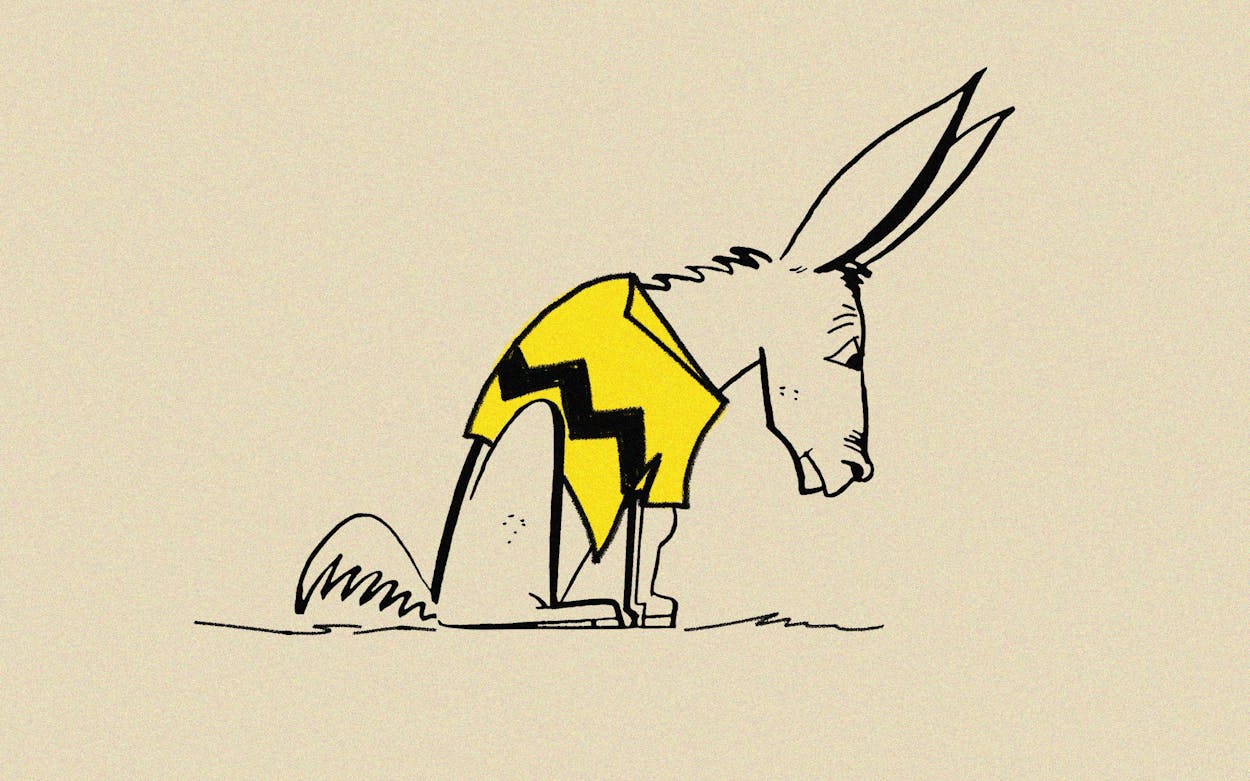As it became clear earlier this week that Texas Republicans would once again run the table in statewide elections, social media lit up with a familiar metaphor. “Texas to Democrats is Charlie Brown trying to kick the football,” one Twitter user observed. “Every 2 to 4 years [they] think they are kicking the field goal but instead Lucy (voters) pull the ball out from them.” On Facebook, a nonprofit executive from Arlington posted an image of Charlie Brown kicking air with the tongue-in-cheek caption, “Texas Democrats believe, yet again, that the race is neck-and neck.”
It’s not really a fair analogy. Lucy at least gave Charlie Brown a good look at the football before pulling it away. Texas Republicans, on the other hand, crushed Democratic hopes so comprehensively on Tuesday—only one Democrat, attorney general candidate Rochelle Garza, came within ten points of their opponent—that election officials would have been justified in invoking the mercy rule. This week’s debacle meant that Texas Democrats still haven’t won a statewide election since 1994—the longest losing streak of any state party in the country.
If the Texas Democratic party were a business, its CEO would surely have been fired years ago. Instead, party boss Gilberto Hinojosa, who has been in charge since 2012, was reelected to another four-year term at this summer’s state Democratic convention in Dallas. The seventy-year-old Brownsville attorney’s tenure has been characterized by a combination of complacency and magical thinking. Every two years, Hinojosa promises reporters that Democrats are on the verge of flipping the state, and every two years, Hinojosa manages to make a loss sound like a win. “There was no red wave in South Texas,” he triumphantly tweeted on election night, which is a bit like a Republican bragging about winning the Panhandle. (Hinojosa did not respond to an interview request.)
“The model isn’t working,” said Carroll Robinson, a Houston law professor and chair of the Texas Coalition of Black Democrats. Robinson ran for party chair at the state convention, finishing third in the voting before dropping out and endorsing Hinojosa. “If we were in the private sector, we would say that, ‘Look, consumers are not buying our products. We have a weak distribution system. We’ve got to go in and rebuild our subsidiaries and our supply chain.’ ”
Robinson is one of several state Democratic leaders who told me the party needs to improve its campaign infrastructure, especially in rural counties, where it performed even worse than in 2018. But when consumers haven’t purchased your product for nearly three decades, it raises the suspicion that you are selling them a lemon. When Ford took its infamous Pinto subcompact off the market in 1980, it wasn’t because the company lacked a robust dealership network but because the Pinto had a well-documented tendency to explode.
Ford eventually learned how to stop its products from blowing up, which is more than you can say for the Texas Democrats. Even their best-selling model in decades, the Beto, lost market share this time around. “The Democrats had a charismatic candidate who campaigned tirelessly and had something close to ninety million dollars spent on his behalf,” said Rice University political scientist Mark Jones, “but they came up short once again.” Indeed, O’Rourke barely improved upon the performance of 2018 gubernatorial candidate Lupe Valdez, the Ford Pinto of Democrats.
In the wake of this week’s disaster, some Democrats have renewed their pleas for a party overhaul. On Twitter, former Democratic agriculture commissioner nominee Kim Olson retweeted a post calling on Hinojosa to retire. Olson came in second to Hinojosa in the party chair race this summer. “I ran against [Hinojosa] in July because I think there’s another way that the Democratic party should go,” Olson told me. Since he’s just been reelected, it’s unclear how Hinojosa could be forced out other than by being convinced to voluntarily step down.
Democrats are “dangerously close to being the institutionalized minority party,” said political scientist James Henson, director of UT-Austin’s Texas Politics Project. “I don’t know how many elections you have to lose before you realize that the other side is just better at turning out their voters than you are.” Henson noted that each of the past three Democratic gubernatorial candidates lost by slightly less than his or her predecessor. But Abbott still trounced O’Rourke by eleven points on Tuesday, suggesting that it will be years, if not decades, before Democrats will pull within striking distance. “The trend is still in the direction Democrats want it to go,” Henson said. “But it’s moving very slowly.”
- More About:
- Politics & Policy
- Beto O'Rourke








